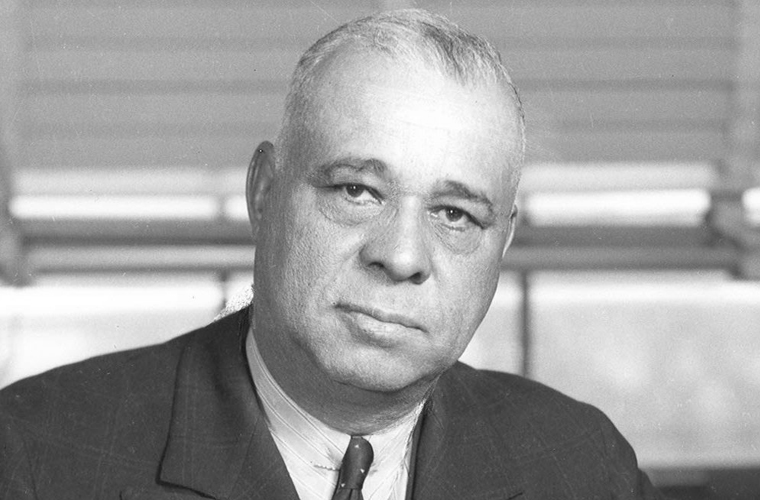The politician Arthur Wergs Mitchell was born in Chambers County, Alabama. He left home at age fourteen and walked to Tuskegee Institute, where he obtained work as an office assistant for Booker T. Washington (1856–1915). He eventually entered Tuskegee as a student.
Mitchell taught in rural schools in Georgia and Alabama, and he founded the Armstrong Agricultural School in West Butler, Alabama, where he served as president for ten years. Mitchell continued his education at Columbia University and Harvard University School of Law, but he never completed the requirements for a law degree. However, he was able to earn admission to the Washington, D.C., bar in 1927, and he subsequently began to purchase tracts of real estate in the nation’s capital. In 1928 Mitchell moved to Chicago, opened a law practice, and became involved with local Republican Party politics.
Mitchell changed his political affiliation to the Democratic Party when, in the wake of the Great Depression, the Democrats adopted a more activist position toward aiding the unemployed than did the Republicans. In 1934 Mitchell ran for the Democratic nomination for Congress from the First District of Chicago. He lost the nomination contest to Harry Baker, but when Baker died before the general election, Mitchell was selected to run for the seat in his stead. Identifying his candidacy with the New Deal, Mitchell defeated the black Republican Oscar DePriest (1871–1951) in the 1934 general election and, in doing so, became the first black Democrat elected to the House of Representatives. Mitchell began the first of his four terms in the House of Representatives in January 1935.
As a congressman, Mitchell supported President Franklin Roosevelt’s New Deal and sided with the president during such controversial administration battles as the 1937 “court-packing plan” debate. Mitchell, by inclination something of a temporizer, was perhaps ill-suited for his role as the sole African-American congressman, and he was often criticized for being insufficiently stalwart in his commitment to civil rights. Mitchell introduced an anti-lynching bill in Congress in 1935 that was attacked by Walter White of the National Association for the Advancement of Colored People (NAACP) for being toothless. Mitchell garnered similar criticism when he was slow to condemn Italy’s invasion of Ethiopia and for his support for the U.S. Supreme Court nomination of Alabama Senator Hugo L. Black, a former member of the Ku Klux Klan. (Despite the misgivings of many African-American leaders, Black was confirmed and proved to be a strong supporter of civil rights decisions during more than thirty years on the Court.)
Perhaps Mitchell’s most significant civil rights battle occurred outside of the halls of Congress. In 1937, while riding on the Chicago and Rock Island Railroad in a first-class carriage, Mitchell was obliged to leave the first-class car when the train reached Arkansas. Mitchell filed suit against the railroad with the Interstate Commerce Commission, which dismissed the complaint. Mitchell then brought a civil suit against the railroad, which eventually reached the U.S. Supreme Court—with Mitchell himself arguing his case before the high court. In 1941, the Supreme Court ruled in Mitchell v. the United States that segregated coach laws for interstate travel were illegal. The decision, however, was largely ignored.
Mitchell left Congress after his fourth term and moved to Pittsburgh, Virginia. For the next twenty-five years, he lived as a farmer and real-estate investor. He occasionally served as an unofficial adviser to the War and Defense departments and became involved in local political campaigns. Mitchell was also active in the Southern Regional Council, a moderate interracial organization that was dedicated to reform of discriminatory racial legislation. Mitchell died in his Pittsburgh, Virginia, home on May 9, 1968.

